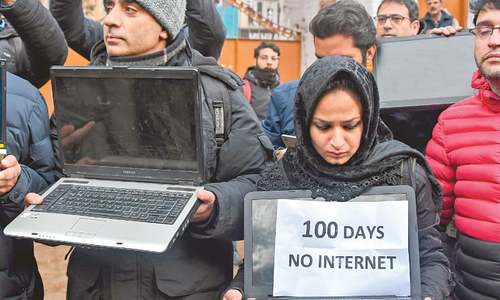ISLAMABAD: Senators belonging to the opposition on Wednesday accused the government of “mishandling the Kashmir issue” and having failed to “effectively act” after the revocation of the “untouchable” Article 370 of Indian constitution.
Taking part in the discussion on the longest ever curfew and lockdown in Srinagar, PPP stalwart Mian Raza Rabbani asked why the government was not calling for release of political leaders in Occupied Jammu and Kashmir and withdrawal of Indian occupation forces from the valley.
“Why the government is shy on internationalising the issue.”
He advised the government to talk to the Muslim Ummah, particularly Saudi Arabia and the United Arab Emirates, and ask them to use their clout to persuade India to change its Kashmir policy.
Abrogation of Article 370 has far-reaching effects not only for Pakistan and India, but also for entire region, warns Raza Rabbani
Terming the Organisation of Islamic Cooperation a “redundant” body, he said it should be asked to persuade India to lift curfew in Occupied Kashmir and send its observers there.
In case it was not done, Pakistan should seek temporary suspension of its OIC membership, former Senate chairman Rabbani insisted.
He deplored that the United Nations was under control of the United States, and said the revocation of Article 370 without covert consent of the US was not possible.
“The abrogation of Article 370 has far-reaching effects not only for Pakistan and India, but also the entire region, he warned, lamenting that the “edifice on which the Indian state stands – pluralism, democracy and independent judiciary – is eroding”.
He noted with sadness that Indian courts were not ready to entertain habeas corpus petitions and the bail which should be available to a common citizen was being denied to political leadership.
The weakening of Indian democratic institutions and marginalisation of minorities had consequences beyond Indian border, the veteran parliamentarian cautioned.
Retired Gen Abdul Qayyum of the PML-N said the PTI government had ignored “BJP’s manifesto and Modi’s intents” which led to emboldening a frustrated Delhi to go for steps like revocation of Article 370. Giving reasons for India’s frustration, he said these included failure in attempts to Balkanise Pakistan, its ouster from the Afghan peace process, progress on the CPEC and internal issues like Rafale fighter aircraft procurement scam against Prime Minister Narendra Modi and drop in GDP from eight per cent down to five per cent.
He said the Indians had “chosen a time to benefit from acute polarisation in Pakistan”.
The PML-N lawmaker called for “giving respect to parliamentarians” and said: “Our strength lies in the democratic system. You cannot draw strength from un-elected advisers.”
The US offer for mediation on Kashmir could be a plot, he said, adding that no mediation should be accepted without pre-conditions.
Jamaat-i-Islami emir Sirajul Haq urged Prime Minister Imran Khan to convene a meeting of the country’s political leadership to evolve a consensual policy on Kashmir.
He said the prime minister had said he would announce a course of action after his address to the UN Security Council, but he had made no announcement and just repeated his warning against crossing of the Line of Control.
“It is time to act,” Sanator Haq declared, warning that Occupied Kashmir would house Hindus in majority after five to six months, if any slackness was shown at this stage.
Barrister Mohammad Ali Khan Saif of the MQM said Pakistan could strengthen its case by raising the Kashmir issue on the basis of human rights violations by India. He said India might try to mislead the world by saying that right to self-determination did not apply in case of Kashmir as it did not apply on secession movements. “This de-facto reality created by India should be effectively countered. Right to self-determination is not linked with a territory, but the people,” the lawyer-turned politician said.
The House will meet again today (Thursday) at 3pm.
Published in Dawn, November 14th, 2019














































